Opinion
Promoting diversity, equity and inclusiveness in veterinary profession
Published
2 years agoon
By
BK Editor
Sanober Rasool
World Veterinary Day
For veterinary professionals, it is crucial to provide socially conscious learning and working environments as well as to eliminate obstacles to fairness and inclusion. Veterinarians operate in a world that is becoming more diverse and swear an oath to uphold public health. Students, team members, and veterinarians must have the knowledge and abilities necessary to meet every customer’s requirements and foster hospitable workplaces for every employee. Although diversity, equality, and inclusivity (DEI) and mental well-being (MWB) are still crucial for the veterinary profession, there is little information available on how professional bodies throughout the world approach these problems. The veterinary profession is a diverse field that offers healthcare and other services to a variety of different animal species. However, despite working with animals that come from diverse backgrounds, the profession itself has not always been inclusive of diversity in its workforce. There is a growing need for the profession to promote diversity, equity, and inclusiveness to better serve the needs of all animals and their owners. This essay will examine some of the ways in which the veterinary profession can promote diversity, equity, and inclusiveness.
One important step toward promoting diversity in the veterinary profession is to increase awareness of the opportunities available to individuals from different backgrounds. This can be achieved by reaching out to underrepresented groups and promoting the benefits of a career in veterinary medicine. Admissions committees for veterinary schools should take into account the unique challenges faced by underrepresented minorities when evaluating applications. This could include adjusting the emphasis given to academic achievements in order to account for the additional obstacles that students from disadvantaged backgrounds may have had to overcome. Making a commitment to diversity and inclusion necessitates uncomfortable levels of participation. Breaking out of our comfort zones might be one of the most difficult obstacles to achieving change in our environments. Discover activities that can help you get out of your comfort zone and into a daring space, allowing you to boost diversity and inclusion programmes in your organisations.
Professional groups and associations can also provide support by offering networking opportunities and resources that help individuals overcome barriers to success. They can also offer resources such as job listings, continuing education opportunities, and access to research and other publications that can help individuals stay up-to-date on the latest developments in the field. Moreover, in promoting diversity, the veterinary profession must also strive for equity in its workforce. This means ensuring that everyone has access to the same opportunities regardless of their background.


Veterinarians should be evaluated on their merits rather than their race, gender, or ethnicity. This principle is central to the idea of meritocracy, which holds that individuals should be rewarded and promoted based on their abilities, achievements, and potential. Policies should be put in place to ensure that there is no discrimination in the selection process for veterinary specialists or in any other job opportunities.
Some possible policies that could be implemented to prevent discrimination in the veterinary profession include:
- Developing a fair and transparent selection process
- Providing equal opportunities: employers should provide equal opportunities for all applicants, regardless of their race, gender, religion, age, or other personal characteristics.
- Educating employees: Employers should educate their employees about discrimination and the importance of non-discrimination in the workplace.
- Establishing a complaints mechanism: Employees should establish a mechanism for employees to report incidents of discrimination and take appropriate action to address such incidents.
- Regularly reviewing policies: Employers should review their policies and procedures regularly to ensure that they comply with anti-discrimination laws and best practices.
By implementing these policies, the veterinary profession can become more inclusive, diverse, and welcoming to all individuals who want to pursue a career in this field.
Finally, inclusiveness in the veterinary profession means creating an environment where everyone feels valued and respected. Veterinary organisations should continue to raise awareness and reduce stigma related with mental health conversations at the national and regional levels through webinars, specific training, and broad ongoing education.
World Veterinary Day. In conclusion, promoting diversity, equity, and inclusiveness in the veterinary profession is essential not only for the well-being of veterinary professionals but also for the animals and their owners. Veterinary organizations, schools, and individual professionals have a responsibility to create a welcoming and inclusive environment that supports and encourages diversity, equity, and inclusiveness. By doing so, the veterinary profession can improve its service to a diverse clientele, foster a culture of inclusion, and better serve the needs of all animals and their owners. It is important to continue the conversation around diversity, equity inclusiveness and mental well-being and take actionable steps towards creating a more inclusive and equitable profession for all.
Veterinarians are essential members of society because of their compassion and caring. They are tasked with treating and caring for sick or injured animals until they are whole and content. So take a chance on World Veterinary Day and give our neighbourhood vets a thank you for all they do for the community.
Sanober Rasool is a PhD Scholar at the SKUAST-K’s Division of Veterinary and Animal Husbandry Extension
You may like
-




RBI penalises Central Cooperative Banks Baramulla, Anantnag for violations
-




Editorial | J&K Budget 2025-26 – A Balancing Act
-




Building FPO Leaders: SKUAST-K, MANAGE Hyderabad complete trainers’ training
-




CII J&K Organizes Health Conclave 2024
-

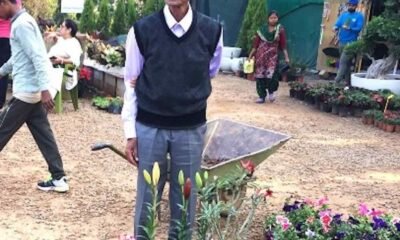


Kya kuchh tha jiske kehne ko: A tribute to father
-

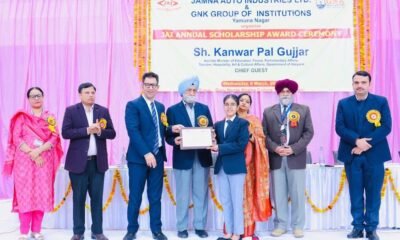


GNK hosts JAI scholarship distribution function
Economy
Editorial | J&K Budget 2025-26 – A Balancing Act
Published
4 months agoon
March 8, 2025By
BK Editor

Fiscal Constraints Amidst Development Aspirations
J&K Budget 2025-26
Preparing the maiden budget for Jammu and Kashmir as the head of an elected government of a state downgraded to a UT and remaining under central rule without an elected government for more than seven years with overwhelming challenges was an arduous task for Chief Minister Omar Abdullah.
While his speech paints a hopeful picture of a “new and prosperous” J&K, a closer look reveals a delicate balancing act necessitated by fiscal realities and the people’s aspirations: high hopes with vivid memories of recent election promises.
As Omar Abdullah seeks to lay the foundation for ‘long-term growth, stability, and self-reliance’ of J&K, he has to walk a tightrope to keep the state’s mounting debt under control. However, his prudent management to keep the fiscal deficit under leash has come at a cost: a leaner budget. This year’s budget allocation of Rs 1.12 lakh crore is Rs 6080 crore or 5% less than last year’s budget announcement of Rs 1.18 lakh crore. The reduction in budget allocation, along with 4-5% inflation, raises concerns about the government’s ability to realise its ambitious development goals fully.
The CM’s speech, though, outlines a comprehensive vision, touching upon crucial sectors like rural development, agriculture, tourism, and industry. But translating these aspirations into tangible outcomes requires substantial financial investment. Moreover, the pervasive challenge of inflation adds another layer of complexity. Rising prices erode purchasing power, making it harder to stretch limited budgetary resources.
As Omar Abdullah seeks to lay the foundation for ‘long-term growth, stability, and self-reliance’ of J&K, he has to walk a tightrope to keep the state’s mounting debt under control. However, his prudent management to keep the fiscal deficit under leash has come at a cost: a leaner budget. This year’s budget allocation of Rs 1.12 lakh crore is Rs 6080 crore or 5% less than last year’s budget announcement of Rs 1.18 lakh crore.
The emphasis on fiscal prudence, curbing non-priority spending, and enhancing revenue collection is understandable, given J&K’s historical fiscal stress. However, austerity measures must be carefully calibrated to avoid stifling economic growth and hindering essential public services, especially when inflation is already squeezing household budgets.
The budget’s focus on digital governance and healthcare accessibility is welcome. Initiatives like the SEHAT app and the expansion of digital services have the potential to improve efficiency and transparency. Yet, the question remains: are the allocated funds sufficient to ensure the effective implementation of these programs, particularly when the real cost of implementation is escalating due to inflation?
The agricultural sector, a cornerstone of J&K’s economy, receives significant attention. The success of the Holistic Agriculture Development Program (HADP) will be crucial in boosting farmer incomes and creating employment opportunities. The allocation to HADP has been reduced Rs 800 crore from last year’s 1000 crore plus. However, the program’s impact will depend on the timely disbursement of funds and effective implementation, and whether the farmers can see real increases in their income, that outpace the rising cost of goods.
Similarly, the ambitious plans for tourism development require substantial investment in infrastructure and marketing. While the government’s efforts to promote offbeat destinations and sustainable tourism are laudable, the sector’s growth will depend on attracting private investment and addressing critical challenges like sustainability and waste management, while also dealing with rising operational costs due to inflation.
Some headline-making announcements like free rides for women in public transport and 200 free units of solarised power for AAY population fail to impress the general public. The argument is J&K has almost non-existent public transport. About 850 public buses with a passenger capacity of 35,000 people do not even suffice the transport needs of the 1% of the 1.2 crore population of J&K. The 200 e-buses for two metro capital cities, announced in last year’s budget, failed to take route. CM has repeated the announcement this year.
The government’s commitment to empowering MSMEs and startups is also noteworthy. However, ensuring access to finance and creating a conducive business environment will be essential for fostering entrepreneurship, and this becomes more difficult when inflation creates financial uncertainty. In last year’s budget, a good amount was announced under Youth Startup and Seed Capital Schemes but both schemes failed to take off.
Also, the budget is unable to address the burgeoning unemployment that, as per some private surveys, has reached 32%.
Whatever the allocations, the success of this budget will be now judged by its ability to deliver tangible benefits to the people of J&K. While the government’s efforts to reduce the fiscal deficit are commendable, it must also prioritize investments that will drive economic growth, create jobs, and improve the quality of life for all citizens, while also mitigating the effects of inflation.
The challenge lies in navigating fiscal constraints and inflationary pressures while maintaining momentum on the development path. This budget sets the stage for a critical year ahead, one that will test the Omar Abdullah government’s ability to balance its books and deliver on its promises, in a climate of rising prices.
Opinion
Kya kuchh tha jiske kehne ko: A tribute to father
Published
1 year agoon
March 23, 2024By
BK Editor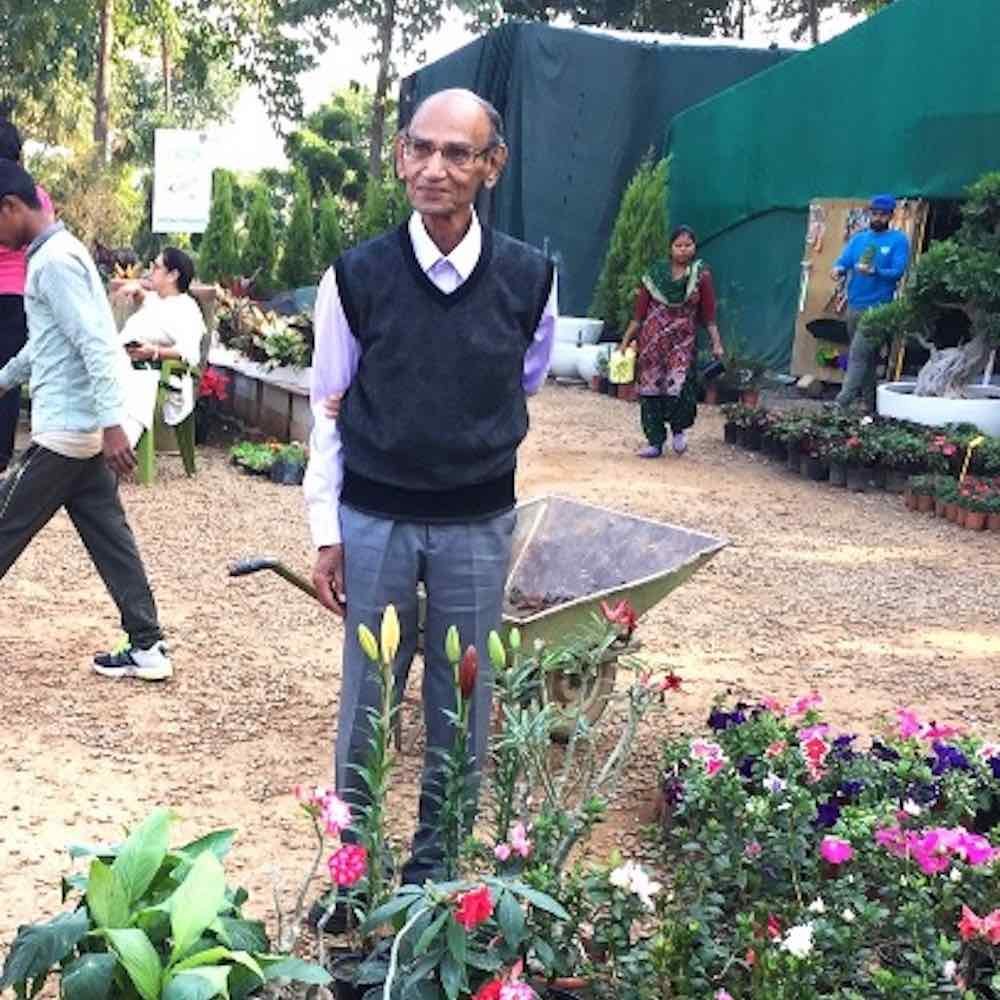

By Zeeba Zaka-ur-Rab
کیا کچھ تھا جس کے کہنے کو
Kya kuchh thaa jiske kehne ko
وہ کہنے والا چلا گیا
Vo kehne vaala chala gaya 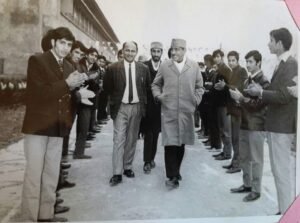

سالہا – سال سہا جس نے
Saalha saal saha jisne
وہ سہنے والا چلا گیا
Vo sehne vaala chala gaya
الجھے – سلجھے خیالات لیے
Uljhe – suljhe kHayalaat liye
چپ رہنے والا چلا گیا
Chup rehne vaala chala gaya
With the reality of his having gone away from this world, still to sink in fully despite the passage of four full months, it is with much hesitation as well as with a rather heavy heart that, a daughter brings herself to prefix “late” to her father’s name, and attempts to pay homage to this noble soul today.
Born as the fourth and the youngest child into a reputable, erudite and affluent family of Amroha, a town in western Uttar Pradesh, Abba (our father), Late Prof. Mohammad Zaka-ur-Rab was one of his kind – a thorough gentleman, a man of uncompromising principles, an intellectual par excellence (who was) far ahead of his times,.. and a multifaceted, ineffably wondrous personality. With humility, soft-spokenness and exemplary Husn-e-Akhlaaq (courtesy, politeness and affability ) as hallmarks, the tremendous amount of sabr (patience) this noble and pious soul was endowed with, is beyond incredible. Abba’s grandfather, Janab Abdur Rab, a highly respected Taluqdar of Amroha, had also served as a Judicial officer of the Royal Court at various places in the erstwhile Rajputana region. This highly acclaimed and principled officer, was also a renowned Persian scholar of his times. Abba’s father, Janab Mohammad Zia-ur-Rab, was one of the only two Deputy Directors of Industries for the entire United Province ( the mother of a much smaller Uttar Pradesh of post-independence era). It is heartening to hear people still refer to him as the most kind and upright Officer Kanpur has ever had. Not the ones to buckle under any pressures, both these righteous great men always stood up for the truth. Underneath their tough exterior, however, nested a soft, sensitive and compassionate heart. Being extremely close to these two great men in the family, their lives and values left an indelible imprint on my father’s personality. It was actually his grandfather who had inducted the habit of rising early and awakened, in him, the love for books and nature, ..habits which Abba retained life -long, and later remembered to pass on to his own children. “Zuka” his grandfather would call out lovingly, at 4 o’ clock in the morning, and slipping tiny little feet into his slippers, Abba would rush to meet him. The two of them, would then set out for a refreshing long walk in their orchards, breathing in the fresh air, enjoying stories and anecdotes with merry chirps of birds as background melody, and discussing important lessons on life, faith, and nature which were to guide him all through his life. A straightforward and extremely benevolent person himself, Abba, later proceeded to nurture in us, as well, the virtues of truthfulness, selflessness, punctuality, impartiality, perseverance, and humility etc. etc right from our childhood. “Fear no one but the Almighty …and the Day of Judgement” …he would remind us frequently,…and as we strolled in the garden, with the morning dew caressing our little feet or rested on the terrace gazing at shiny stars at night, he would, in an effort to ignite the young researcher in us, often say “Learn to observe.. ‘Ghaur karo’ .. Allah himself has commanded”……
Having lost his father, while his intermediate examinations were underway (and his grandfather even earlier), he learned to endure adversity with great poise and fortitude at a fairly young age. Deeply attached as he was to his father, Abba a very bright and meritorious student all through, did not let the tragedy affect his educational excellence or achievements. Going against the wishes of most relatives and family friends, who, at that time, advised him to skip (the exams), he decided to do what his father would have wanted him to, that is …write the exams and silence them all with his results. So, each morning the very young and grieving Zaka would leave for the graveyard, offer fateha (prayer) and sit crying by his beloved father’s grave,… and when it was time to leave, the broken-hearted child would pull himself together, and seeking his departed fathers blessings, proceed to the examination centre. Abba used to often narrate, in a voice choked with emotion and a sense of great respect and immense gratitude still palpable, how his teachers from B.N.S.D. Inter College (where he used to study in Kanpur), would specially care to come to the examination Centre, which was some 5 kilometres away from their college, only to place their hands on his head, wish him luck, and comfort him saying “Though your father is no more…Don’t for a moment feel that you are alone…Beta (son), we were there for you,” ..These kind and much needed words for a child in that state, remained deeply etched in his mind, and Abba continued to remain truly indebted to his teachers, holding them all in high esteem throughout his life. To this day, his words stressing respect for teachers resound in our ears “A teacher must never be disrespected..( for ) anyone who does so, earns nothing but humiliation and disgrace in his life)..”… “The one standing between the table and the blackboard should be listened to with rapt attention, (because) howsoever little one may think he/she knows,.. he definitely knows more than the student”…and “Observe your teachers carefully, .. Resolve never to repeat ( yourself) if ever you find something disapproving ,.. but try to do even better whatever you find good (in them)…”
A tireless worker, Abba knew no shortcuts. His analytical mind, scientific approach and a keen eye for details made research come almost naturally to him. From a young age, a passion for education and progressive thinking was fired and fuelled by his mother, Syyeda Begum, an enlightened homemaker who, herself, had received only informal education by a lady tutor, especially, hired by her father to impart English lessons at home. “Wo ilm hi kya, jo dil-o-dimagh roshan na karey ! (what use is education which fails to enlighten the heart and soul)” he would fondly recall his mother say. Armed with an insubvertible zest for knowledge, which lasted his lifetime, and an amazingly unparalleled knack for simplifying tough topics, Abba turned out to be a fabulous and popular teacher himself… one, who could teach just any subject or topic, to anyone, with great ease. It is difficult to fathom or forget how he could make easy for us, complexities of even medical subjects during our graduation and post-graduation days!.. His succinct hand written notes, meant for a quick revision before our MBBS, MD/ MS examinations, and later even for job interviews are preserved with us to this day.
Prof. Abdul Hameed Hakeem Sb. has penned a well-deserved, beautiful and fairly exhaustive tribute titled “The pioneer of agricultural education and extension in Kashmir,” highlighting our father’s many qualities and contributions ( Editorial page, Greater Kashmir, November 24, 2023). Each line, in this article, is so true, and each fact so well-articulated and elucidated, that (reading) it, literally, took our entire family down the memory lane, bringing back memories so vivid and pleasant of our wonderful early childhood in Wadoora…. A life filled with plentiful laughter and gay abandon in the breathtakingly beautiful, fragrant and picturesque landscape surrounded, on all sides, by blue snowcapped mountains….. the imposing house with wooden floors and sloping roofs standing tall, its walls covered elegantly with luxuriant dark green ivy creeper playing a loyal nanny to generations of little birds, (with) its shiny broad leaves and maze of strong tendrils sheltering their nests and eggs from predators, ….the aesthetic lush green lawns and idyllic gardens laid and nurtured painstakingly by Abba…. A life amidst vibrant flowers, delicious fruits and berries, exotic vegetables, and also pets aplenty,… ranging from hens and chicks, nightingales, doves, partridges, Japanese quails to even insect larvae… each of which, could boast of a unique name of its own, depending on a characteristic that had managed to catch the children’s watchful eyes.. Tick–tika was one such name, given to a fat, fluorescent green larva which constantly produced ticking sounds while nibbling away, ravenously, at fresh piles of tender leaves which our mother introduced, dutifully, in its jar every morning …whereas Kudki was a broody dusky grey hen, which went “kuduk kuduk”, pecking merrily around on insects, young frogs and seeds.. and, yes, frogs,…how could I forget those creepy creatures !?…there were hundreds of them there, ready to scare the life out of me!… a fear, which my other two sisters, enjoyed to cruelly exploit to the hilt, …chasing me around the house with the little four legged monsters on their badminton racquets …poised to leap (at me), … in a get, set, and go position…! Horrified, I used to refuse to step out, and it was Abba who always came to my rescue … “Meri beti ko koi tang nahi karega (no one should trouble my daughter)” he gently rebuked my sisters, and ensured the jumpy menace was gathered in baskets from the lawns, and tossed gently across the fence.
Abba, was, in fact, the first non-state subject to have been made permanent in his J& K service…a fact which surprises many. The article by Prof. Hakeem also brought alive the joy, warmth and PRIDE of being ABBA’s three little daughters. A myriad scenes began to play, before our eyes, …. the radiant glow regularly lighting up our parents’ faces as they saw the college grow and achieve milestone after milestone, and its products attain greater and greater heights … glimpses of the happiness and contentment on his face as Abba scanned our school report cards, and heard from my mother the feedback from our teachers ……flashes of Abba, (with) his back resting against the headboard of the bed, a cup of piping hot coffee in his left hand, giving dictations for his research papers etc. to Ammi, our mother, who doubled as his stenographer at home, and whose valuable inputs and suggestions Abba always welcomed … Also came rushing in, recollections of how we would see him off each morning, even proceeding to clamber up the tall wooden main gate, in an effort to keep watching him as long as we could, ….and then as evenings drew near, perched atop branches of Albizia trees, covered in fuzzy baby pink blooms, lining the driveway, we waited eagerly for him to return. Years later, as if in reciprocation, even after his frame had been rendered frail by age, Abba would still stress on seeing us off daily at the main gate, …where he would continue to stand and watch, until the disappearance of the rear of our car into the next lane. Fast forwarding to the present, with his going away forever, that wait (for our Abba), albeit extremely heart-breaking and unending this time, has just begun for us all over again …!
Although most of the crops and trees, Abba got planted in Wadoora, do find a mention in the article by Prof. Hakeem, I would like to add a few more which our family could recollect. It was common in those times, for heavy snowing or landslides to cut the valley off from the rest of the country for weeks or months together. A man of great foresight, energy and grit, Abba wished to see the valley become self-sufficient in sugar production. This thought led him to introduce the plantation of sugar beet as well as sweet sorghum, from both of which, sugar could be processed just like from sugarcane,.. but at a much lesser expense. Additionally, these two crops could yield animal fodder as well as ethanol. He had also conceived the idea of setting up a Gobar gas plant in the College, to recycle waste from the dairy, for the production of biogas, a clean, unpolluted and cheap source of fuel in rural settings. Abba was also the one to have introduced orange trees which, till then, had not been planted or seen to bear fruits ever before in the valley. On either side of the path to the college, he had got silver poplar trees planted. The avenue of these eloquent trees, with their silver leaves shimmering in the sunlight like wings of little fairies, was a sight to behold…
I would specially like to recount here, an interesting anecdote around sugar beet, which some of his colleagues or students might still be able to recall. Winters were approaching fast, and sugar beet was still awaiting transplantation. With snowing just around the corner, and an unexpected strike by Maalis (gardeners) of the College, Abba was left very very worried. “Pray beta … pray that, whatever you Abba wishes for, gets to happen today ”.. Ammi urged us, in a visibly worried voice, without disclosing any further details to the younger two of her daughters. Aapa, the eldest, the most serious of her daughters(though not much older than us) who was treated by Ammi as her confidante and friend all along, was, however, often privy to many tensions or problems about which the younger two of us could only have a vague idea at best. “ I will plant them by myself today … can’t see all of them perish.. at least a few might be saved” Abba thought out aloud, as he started to transplant the sugar beet with his own bare hands… Seeing their college Principal work in the field, ..the staff members, rolling back their sleeves and pants, joined in too…and soon enough, the entire college, including students, had pitched in… It seemed Allah had answered our innocent prayers, and within no time the entire work was done…That day, “Saathi hath bhadana ” a popular Mohd. Rafi song from an old and famous Hindi Classic “Naya Daur” seemed to have been re-enacted, albeit in a refreshingly new way, in the fields of this beautiful college, tucked away in a remote village of the valley of Kashmir,… and as if in celebration of the team work and spirit, .. a fine drizzle soon followed the planting of the last row. ….The next day, a thick blanket of snow had descended all over the campus.
How much this college actually meant to Abba, can be gauged by another incident, from several years ago, which Ammi often recounts. It was the winter of 1971 when the valley saw itself embroiled in yet another Indo-Pak war. Even though almost all other families had moved to safer zones, our father refused to leave the campus, a decision backed fully by our mother. When some colleagues tried to convince him to shift out as well, he retorted calmly “ Does that place have a different and more powerful Allah from the one we have with us here!?”.. One particularly chilly night, our house, standing lone in the darkness, was shaken violently with an ear shattering, loud boom, seemingly from bombardment in some place quite near… Abba rushed out of the house crying out in despair “they have destroyed my college… sab tabah kar diya”…Ammi had to literally run out and pull him back in pleading “ if , God forbid, it has already happened,..is your rushing there at this hour, .. in the dead of the night, going change any of it??”
Coming back to the obituary by Prof. Hameed Sb., not only were we greatly overwhelmed and deeply moved by his article, but also felt extremely indebted to him for having, diligently and honestly, put on record, for the world to know, … who Abba was, …what a remarkable foresight he possessed,.. and all that he had managed to do, way back then, for a college he was so completely dedicated to….However, at the same time, unbeknown to Hameed Sb., another thing which the article also ended up doing, unintentionally, was to uncover some old sores as well. Wounds, which still oozed and bled somewhere deep down within our hearts…and which over the years, even we had convinced ourselves to believe, ceased to exist…A pall of impenetrable silence and gloom seemed to descend on Ammi and the three daughters who Abba had left behind … During the entire day, we could not help feeling that long forgotten pain and the same anguish all over again … That particular night, none of us could catch any sleep… and as I lay awake, staring at the ceiling, I felt compelled to write my own tribute and elegy to a father like none other in this world ..a father, who instead of admonishing his daughters, himself proceeded to teach them to climb trees, offering in the process, his own palms to step on… A father, who in a bid to empower his daughters and decrease their dependence on others, not only taught them to send telegrams, withdraw and deposit money, fill admission forms themselves (from a pretty early age), but also trained them to change tyres before teaching them to drive!…A father, who instead of imposing his own wishes or restrictions, opened up the skies in all their entirety for them (as far as his resources could permit).. A father, who, howsoever tired or tense he was , always entered his home with a warm smile on his radiant face,.. and cared to keep up his promise of playing badminton with each of his little daughters… A father, who despite his hectic schedule, not only wrote timely replies to his children, but always cared to enclose (within the same envelope or inland letter), the original letters addressed to him as well, appending little notes in his trademark neat and mature hand…Notes, appreciating their tender sentiments, but at the same time, guiding them, gently, on how a particular sentence could be framed better… or an alternative word or expression used….
Abba not only had great command over both English and Urdu, but he could also speak Persian with great elan. His DSc. (Doctor of Science – a degree higher standing than Doctor of Philosophy [PhD]) thesis won remarkably strong words of praise from highly acclaimed foreign experts, not just for the exceptionally high quality of his research, but also for the linguistic beauty of expression as well as for the exquisite diagrams which he had himself inked. Not many in Kashmir might, however, be aware that Abba, who was a very fine and sensitive artist at heart, wrote beautiful poetry as well. A great admirer of art and handicrafts, he never let my mother bargain. Siding always with the seller, he would convince her “ they work so hard all year long, ..why eat into the little profit they wish to make!”
Just like at any other place, life in Wadoora, too was peppered with small worries and tensions. However, despite the usual ups and downs, faced by almost all office goers, broadly speaking, Abba and his small family of five, were happy and contented. Life was fine, until one day, when suddenly like a bolt from the blue, some fairly, unsavoury events were orchestrated by a few people with nefarious designs and vested interests. Not the one to bow down to pressure or injustice, Abba decided to proceed on a long leave and left for Aligarh. Those unfortunate events, left us terribly terribly hurt and shaken. Our honest, soft- hearted, and sensitive parents were the hardest hit. It, definitely, wasn’t a question of any post or promotion having been denied…(Abba was the last one to have run after position, power, money or fame).. The sorrow and hurt, were all about a doubt having been cast on the impeccable integrity of a person as scrupulously honest and hardworking as him,.. about having been let down by his own … about having had to go far- far away from where his heart always lay and continued to ( lay) till the very end of his life and…last but nt the least, an illustrious innings having been undeservingly cut short…..
Quiet and uncomplaining , Abba, an epitome of “sabr,” never once complained to Allah or cursed anyone. Seldom expressing any frustration or pain, he chose to use a dignified silence as his armour instead. However, we, as his family, could still sense it all. Although we all tried to put up a brave front before each other, the harsh reality was that, each member of our family was impacted in ways more than one… the temporary, but severe financial hardship, was just one of the many consequences. Though he came from a rather well-off family, complete immersal in affairs of the college had left Abba with little time to devote to his ancestral property. This inattention, later, cost us dear,.. and before we could realize it, almost everything including his house, orchards, and other land holdings in his hometown, had been usurped by caretakers as well as outsiders. Ammi who, from the beginning, multitasked as an efficient homemaker, loyal friend, and a competent research and personal assistant to her husband (at home), continued to stand steadfast, uncomplainingly, with him through thick and thin … the unimaginably strong bond of absolute trust, care and affection they shared mutually, all their lives, is an example for all…Our parents (who were first cousins) shared many qualities and virues and remained totally inseparable and wholly devoted (to each other) till the very end..
In the ensuing years, Abba a picture of grace, indefatigable and indomitable spirit, and complete faith in the Creator, managed to veer us through all the turbulent and fairly difficult times with dignity and composure. “Have unquestioning faith in him( the Almighty)… uski rassi mazbooti se pakde rakkho..aur uski raza mein raazi raho”…he would remind us pointing at the sky. “Ye kya hai (what is this)!?… Zinda ho beti, tou zindo ki tarah jeena seekho… Learn to live your life with zest and zeal…” he would gently chide, whenever he saw any of his daughters pull on a long face… To pep our sulking spirits up, he would reiterate “Waqt kii sabse baDii Khoobi hai ke guzar jaata hai,.. achha bhi or bura bhi (The greatest beauty of time is that it passes, …both good as well as bad,” …and in the due course of time, we really got to see it happen, when, by Allah’s grace and our family’s resilience, we succeeded in overcoming the transient hardships….What could never be undone, however, was the tragic loss of, what could have been, some of the most productive years of life of this young, enthusiastic, and honest researcher and administrator. Looking back at all that Abba had managed to painstakingly accomplish during his tenure as Principal at Agriculture College, Wadoora, and knowing what his calibre was, …it pains us greatly to realise how much more he could have contributed, had all the dreams and plans (which) he had envisaged for the future development of his college, not been dashed so abruptly ..and so ruthlessly many many years ago by a few self-seeking men, …some of whom later went on to personally apologise to Abba, accepting and repenting the immense and irreversible damage (they had) caused to a person as honest and sincere as him …
After leaving the Agriculture College at Wadoora, Abba was conferred the prestigious National Fellowship by the UGC which gave him the opportunity to conduct research in the Department of Zoology at AMU, of which he was an Alumnus. He also briefly served as a Professor of Entomology at the University of Benghazi in Libya. It was during this time that America attacked that country, leading us to plead with him to return. Abba eventually retired from SKUAST – Kashmir as Professor cum Chief Scientist before joining the Institute of Agriculture at Aligarh Muslim University as Director. However, despite all that he accomplished in life, Abba sometimes, still rued the unrealised dreams he had for ‘his’ College in Kashmir. Even after the passage of so many years, Agriculture College Wadoora still remained ( and shall always continue to remain) “The College” for our entire family! There is yet another precious dream which, now, shall sadly remain unfulfilled forever, … that of taking our parents on a visit to Kashmir, getting them to meet everyone, and see one more time “our” house and “Abba’s college” in Wadoora..“ Hazaron khwaahishein aisii …”
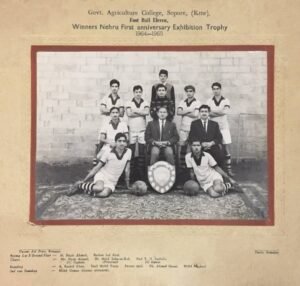

Abba with his college football team (1964-65)
Notwithstanding, all the trials and tribulations he was undeservingly and unfairingly subjected to, Abba harboured no bitterness or ill will towards anyone,.. his pious heart having only prayers, sincere words of advice and good wishes for one and all…a truth, we as his daughters, can vouch for …
I have (ignoring my rather limited proficiency in vocabulary and expression) attempted to pen down some thoughts and questions (on those ‘unfortunate events’ of Wadoora referred to in the preceding paragraphs) which, I felt, might have played, sometimes, on Abba’s mind. Since, words in any given language may have more than one connotation, I have tried to mention, at places, the relevant context of their use:
کیوں چھین ہَزارَہ مالی سے (hazaara: a pot for sprinkling water on plants)
Kyun chheen hazaara maali se
رخ باد سباء نے موڑ لیا ؟
RukH baad-e-saba ne moD liyaa?
گلشن میں جس جاں بستی
Jaa(n) basti, jis Gulshan mein
کیوں خاموشی کو اوڈھ لیا؟
Kyun kHamoshi ko oDh liyaa?
گل خاروں مین تبدیل ہوئے (kHaaron: thorns)
Gul kHaaron mei(n) tabdeel huey
بلبل نے نَغْمَہ چھوڑ دیا
Bulbul ne nagHma chhoDh diyaa
تھا عِلْم وَہاں چَھلْک تا جو
Jo chhalkaata, tha ilm vahaa(n)
!پَیمانَہ ہی وہ توڑ دِیا
Paimaana hi vo toD diyaa !
ماںجھی کے سب پتوار لیے
Maanjhi ke sab patwaar liye
طو فاں کی جانب موڑ دیا
Toofa(n) ki jaanib moD diyaa
کیا-کیا کرنے کی خاہش تھی
Kya-kya karne ki kHaahish thii
نے سپنا توڑ دیا بَیری (Bairi:one who bears a grudge; adversary)
Bairi ne sapna toD diyaa
نہ جانے کیسی رنجش تھی
Na jaane kaisi ranjish thii 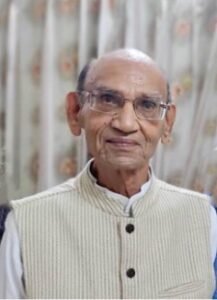

یوں رسوا کھالی چھوڑ دیا
Yoo(n) rusva kHaali ChhoD diyaa
بنجارا گٹھری باندھ چلا
Banjaara gatHree bandh chala
اَپنوں نے ہی دل توڑ دیا
Apno(n) ne hii dil toD diyaa
دنیا کے تیوَر کیا بدلے
Duniya ke tewar kya badle
نے رِشتْا جوڑ لیا ْ پھر غم
Phir gham ne rishta joD liyaa
پیر چُھپائے چھپ نَہ سکئ
Peer chhupaey chhup na sakii
چھوڑ دِیا ہنسنا ثے اور دل
Aur dil se ha(n)sna chhoD diyaa ..
The last seven months of Abba’s life were spent on ventilator in the ICU of Jawaharlal Nehru Medical College at AMU, Aligarh, due to complications arising from a badly messed up tracheostomy procedure conducted, by a callous senior anaesthetist, one fateful April evening. This was the toughest, the most trying of times for all of us, when Allah, it seems, chose to test Abba’s sabr once again and to the fullest. Desperate to hold him back at any cost, his three daughters never, for a moment, left his side,..and kept struggling, clinging on to even the faintest rays of hope, praying for a miracle to happen, .. and trying all that was within their might to see that he recovers ..… The doting father that Abba was, he too played his part well in his daughters’ struggle, … continuing to fight along bravely until the very last, .. bidding adieu to all, on the night of November 13, perhaps, only when reassured that his Master had infused enough strength to keep his family from crumbling…
سو زخم سمیٹے آن٘چَل میں
Sau zakHm sametey Aanchal mei(n)
پروانہ گھائِل چلا گیا
Parwaana Ghaayal chala gaya
چمن کا دِیوانَہ اپنے
Apne chaman ka deewana
دِلْ سوز وہ عادِل چلا گیا (dil soz:benevolent; Aadil : fair)
Dil soz vo aadil chala gaya
کا مظہر تَمَدُّن تہذیب و ( Mazhar: manifestation)
Tahzeeb-o-tamaddun ka mazhar
وہ مخلس , لا ظِل، چلا گیا ( laa-zil: gold sans any impurity )
Vo mukHlis laa-zil chala gaya
پابَنْدِ تَعَیُّن ، پاکیزاہ ( paband- e -taa’yyun: man of his words)
Paband- e -taa’yyun, pakeezah
اک پیر کامل چلا گیا ( peer- e- kamil: perfect mentor)
Ik peer- e- kamil chala gaya
جب بھیڑ لِوانے ای تو
Jab bheeD livaane aaii tou
اپنں سے غافِل چلا گیا ( ghafil:oblivious)
Apno(n) se gHafil chala gaya
عآہستہ بوجھل قدموں سے
Aahista bojhal qadmo(n) se
نَظَروں سے اوجَھل چلا گیا
Nazro(n) se ojhal chala gaya
سب شور شَرابہ چھوڑ یہاں
Sab shor -sharaaba chhoD yahaa(n)
بیراگی رائِل چلا گیا (bairagi: saint; raahil: traveller)
Bairaagi raahil chala gaya
کیا کچھ تھا جِس کے کہنے کو
Kya kuchh thaa jiske kehne ko
بن بولے کافِل چلا گیا ( Kaafil: a man who fasts often, & during which imposes silence on himself)
Bin boley kaafil chala gaya
سالہا- سال سہا جس نے
Saalha saal saha jisne
وہ سابر باسِل چلا گیا ( baasil: brave )
Vo sabir baasil chala gaya
حسن صَبْرٌ کا پیمانہ
Husn -e -sabr ka paimaana
بےخوف وہ عاہِل چلا گیا (Aahil: king)
Be-kHauf vo aahil chala gaya
اپنے چمن کا دِیوانَہ
Apne chaman ka deewana
وہ مُشْفِق باادِل چلا گیا (mushfiq: kind, affectionate; baa-dil: with heart)
Vo mushfiq baa-dil chala gaya….
Even though pages after pages can be filled without doing full justice to the memory of this marvellous human being, but as I proceed to conclude this rather lengthy write-up, I can almost visualize Abba in his favourite blue dressing gown, standing, near his desk, glossing over the paper … (with) spectacles in his right hand… “This time you were totally wrong Abba, with a loss far too great to get over, and a void too huge to ever fill, how did you think your family could stay afloat without you!??…but as you always said ‘Allah ki raza me raazi tou rehna hii hoga’…we must bow to His will, .. Allah Haafiz…. May the Almighty Allah grant, you the highest place in Jannatul Firdaus, and give to us, just a small fraction of the Sabr which he had chosen to bestow on you, our angel.. Aameen!”
Prof Mohd. Zaka-ur-Rab is survived by his wife and three daughters Simi, Zeeba and Atia Zaka-ur-Rab who are serving as Professors in the Departments of Ophthalmology, Pediatrics and Surgery, respectively at Jawaharlal Nehru Medical College, AMU, Aligarh, Uttar Pradesh
Economy
Global eCommerce boom and local traders of Kashmir
Published
2 years agoon
March 5, 2023By
BK Editor

A Structural Shift in the Market Preferences
Dhaar Mehak M
Tabeen J Wali
The global eCommerce market was expected to be worth a total of $5.7 trillion by the end of 2022. That figure is estimated to grow over the next few years; exhibiting the fact that borderless eCommerce is becoming a profitable option for online retailers. It is giving a market space to one and all with a potential or product to sell. Only two years ago, 17.8% of sales globally were made from online purchases. That number is again expected to reach 20.8% by the end of 2023; a 2 percentage point increase in eCommerce market share. This growth is expected to continue, reaching 23% by 2025, translating to an increase of 5.2 percentage points in just five years.
Economic projections and forecasts predict the global retail sales growth to rise even further and take up more retail market share. According to research completed by eMarketer and Statista, online retail sales will reach $6.51 trillion by 2023, with eCommerce websites taking up 22.3% of total retail sales. Although retail has had it tough since 2020, every national market covered by eMarketer saw double-digit eCommerce growth. The trend continues globally: Latin America (including Peru, Brazil, Argentina, Chile, Colombia, and Mexico) saw $104 billion in eCommerce sales in 2022, up 22.4% from $85 billion in 2021. The UK is forecasted to continuously increase by $85.7 billion (+42.88%) within the next years.
China continues to lead the global eCommerce market, accounting for 46.3% of all retail eCommerce sales worldwide, with total online sales just over the $2.8 trillion mark in 2022. It also has the world’s most digital buyers, 842.1 million, representing 39.4% of the global total. The US eCommerce market is forecasted to reach more than $904.9 billion in 2022, a little over a third of China’s. After China and the US, the third-largest eCommerce market is the United Kingdom, taking up 4.8% of the retail eCommerce sales share. The UK is followed by Japan (3%) and South Korea (2.5%). The top five eCommerce markets haven’t changed since 2018. Trends from eMarketer suggest that these markets will stay in the top five until 2025.
While the whole world has been witnessing the structural transformation and shift in terms of market transformations from retailing to online shopping, the Indian economy has been a part of the process. In light of the same, the Jammu and Kashmir economy has had an equal and equally growing participation in the same. The advent of the internet and the arrival of eCommerce technology in the lives of average Kashmiris have changed the shopping preferences and experiences of the locals. People no longer have to battle issues like vehicular traffic on the roads or wait in queues for long hours. Accredited to the growth of eCommerce technology, locals have been empowered to shop anywhere-anytime just at the click of a button.
However, in the recent past, there was no (or very limited) concept of eCommerce in Kashmir. Smartphone availability to the general public was rare. The masses were barely aware about the internet facilities and global communication channels. There was no idea of online shopping, online transactions, etc. With time and the availability of the internet along with the growing mobile phone penetration, eCommerce made its presence felt in the valley. However, due to slower internet connection issues like 2G and lack of awareness, people initially had apprehensions and thus were afraid of buying things online.
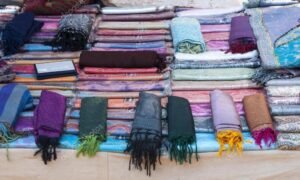

Tracing the roots and history of online shopping awareness in J&K, it dates back to the year 2008 when the mobile internet was making its headway into the valley. People were gaining affordable and available access to wireless internet. It was around the same time that after bearing a lot of hardships with sorting out the supply chains Flipkart became operational and function in the region. the initial years were tough and hard but the company stood steadfast. It took some time for Flipkart to cut through lots of hurdles alone and get to success. Being the only player in the online market in the region for quite some time it was a big deal to keep surviving and floating. But the outcomes were a success.
Steadily as people gain access to quality internet services and advanced smartphone technology the word spread. It was observed that doorstep delivery was actually a reality. At the same time, the quality of the delivery matched the promises of the website. The trust factor got built. Witnessing optimism within the J&K market, other companies like Amazon, SnapDeal, and other local online stores, etc., started jumping in to tap into the growing eCommerce market. The consumers got the opportunity of choosing from a wide range of products. Not only that, discounts and sales from time to time offer big benefits to consumers.
All these factors have been contributing towards a structural market shift. People from across J&K have been moving from in-person retail shopping to online shopping. While the consumers in the region have surely benefitted both in terms of utility/satisfaction and profit maximization, the retailers have been losing.
The J&K economy is predominantly characterized as a consumer economy. The characteristics of being a producer and self-sufficient economy have been limited and rather absent for a long time. It is the retailer of J&K, who has been at the losing end on account of the growth of the online markets. Retailing has been one of the most common business ventures of people across the region of J&K. Setting up of the shops and selling various items has been a known venture. People for generations have been relying on this activity. Lately, the structural change is challenging this segment of J&K businessmen and the immediate solution visible is evolution. These businessmen, particularly retailers, need to adjust to the changing market and make themselves competitive enough to compete with global online sellers. The only other option is to let the business supper, deteriorate and shut down.
The authors are affiliated with the Department of Economics, Islamic University of Science and Technology & can be reached at dhaarmehak@gmail.com and tabeen45@gmail.com


RBI penalises Central Cooperative Banks Baramulla, Anantnag for violations


Editorial | J&K Budget 2025-26 – A Balancing Act


Building FPO Leaders: SKUAST-K, MANAGE Hyderabad complete trainers’ training


CII J&K Organizes Health Conclave 2024


SKUAST-K to hold mega Science Summit on Aug 23-24


Haryana Biodiversity Board commemorates International Biodiversity Day at GNK Group Of Institutions


Kya kuchh tha jiske kehne ko: A tribute to father


GNK hosts JAI scholarship distribution function


Administrative Council approves J&K Startup Policy 2024-27


How to begin investing
Trending
-

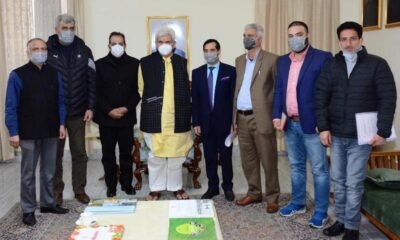

 Industry4 years ago
Industry4 years agoFCIK hails LG Sinha for creating entrepreneur-friendly industrial ecosystem
-



 Economy2 years ago
Economy2 years agoGlobal eCommerce boom and local traders of Kashmir
-

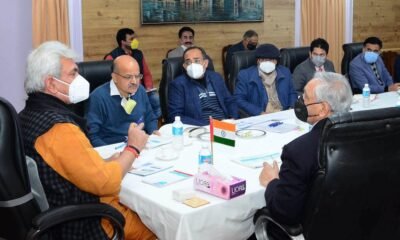

 Energy4 years ago
Energy4 years agoLt Governor discusses J&K power scenario with experts
-

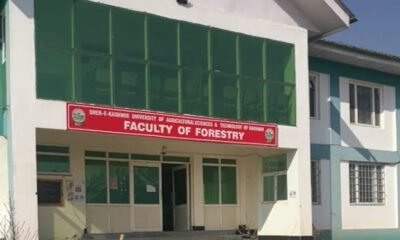

 Infra4 years ago
Infra4 years agoSKUAST-K bags EU project for urban green infrastructure
-

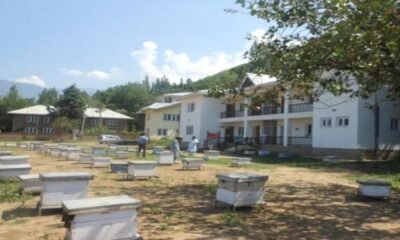

 AgriBiz4 years ago
AgriBiz4 years agoSKUAST-K to set up 3 honey testing labs in Kashmir
-

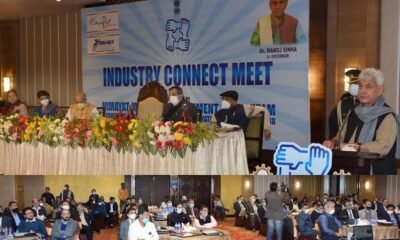

 Jobs5 years ago
Jobs5 years agoJ&K Govt holds Industry Connect Meet-Himayat 2020
-

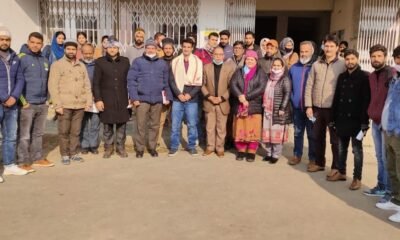

 Careers5 years ago
Careers5 years agoSKUAST-K holds career counselling at Wadura campus
-

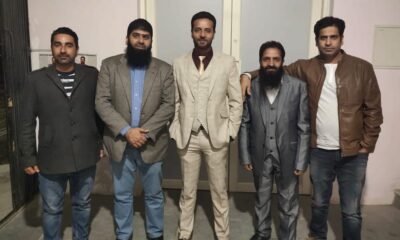

 Industry5 years ago
Industry5 years agoImran Murtaza takes oath as president Industrial Association Khunmoh

